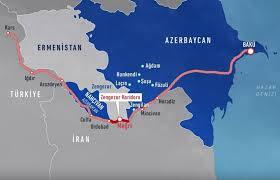
The United States has proposed taking over the planned transport corridor between Armenia and Azerbaijan claiming to advance long-stalled diplomatic negotiations between the two Caucasus nations, the US ambassador to Turkey, Tom Barrack, told journalists during a briefing on Friday.
Although Armenia and Azerbaijan reached consensus on a draft peace agreement in March, Baku continues to insist on several additional conditions before formally signing the deal.
To know more about the issue and US goals, TABNAK reached out to Nader Entessar, professor emeritus of political science from the University of South Alabama.
Following is the full text of the interview with him:
The US says it aims to facilitate peace between Azerbaijan and Armenia. What are the real goals of the US?
There are two overriding geopolitical interests that the US intends to enhance here. One is to further cut off Iran from the Caucasus and Central Asia and thus tighten Iran's encirclement in its neighborhood. The second goal is to force both Baku and Yerevan to distance themselves from Moscow at a time when tension between Russia and both of these countries is on the rise and Moscow is focused on its war against Ukraine.
What can be the advantages of the US proposal for the country?
The main advantage for the US is to establish a firm foothold in the region, where Washington's presence has not been as pronounced as its major adversaries. Moreover, the energy and economic resources of the region are very tempting for Trump's America.
How can this affect China's One road- One belt project? And basically, what are the possible security and economic threats of the US proposal to China?
China's road and belt initiative is an extensive, multifaceted, and multilayered project that covers vast areas. Although the US's creeping incursion into the South Caucasus will put a dent in China's road and belt project, it will not, by itself, derail China's projects.
The EU has supported the US proposal, can this create any security or economic threats to Russia's interests in the region?
Yes, especially at a time when Russia is preoccupied with Ukraine, and Moscow's relations with both Baku and Yerevan are at the lowest point since the disintegration of the Soviet Union.
Armenia has announced that it would not hand over the control of the corridor to a third party, but to push Armenia, but Turkey has told Yerevan that the new developments in the region has weakend Iran position. Do you think that Yerevan will finally accept the US proposal? How can this affect Iran's interests?
Yerevan has been steadily moving towards the West in the last few years. Also, the Armenian government is weak and is in no position to challenge Washington's plans. Besides, Turkey views the present moment as the best opportunity for Ankara to finally achieve its longstanding goal of dominating the Caucasus and Central Asia and turning Iran into a weak and marginal regional player. Iran will take a significant, if not mortal, hit in its projects, like the North-South Corridor.
If Armenia and Azerbaijan agree to open the corridor under a certain formula. What is the best approach for Iran to face this reality?
Unfortunately, Iran's policies in the Caucasus have long been reactive and generally weak, especially towards Baku. The more Baku pushed Iran and challenged its security and economic interests, the weaker Iran reacted. This has allowed Baku to ingratiate itself with Iran's adversaries, like Israel, and cement its ties with them to harm Iran's interests. Iran has always been "a day late and a dollar short" and has been paying for its inertia for many years now. There are few options available to Iran at this time, and none of them are appealing. One option is to focus on doable policies and plans, and refrain from issuing "red lines" that Iran has no intention of enforcing. In the past, many Iranian officials had declared that the Zangezur Corridor was Tehran's "red line" concerning plans by Turkey and Azerbaijan. Red lines are credible when there are specific consequences when the target party crosses them. I am not sure if Iran intends to do anything meaningful once Tehran's Zangezur red line is crossed. If it does, then it is now time to do so.
Interview by Payman Yazdani